Some things just go hand in hand — unfortunately, parenting and sleep deprivation make up one of those perfect pairings. Sleep deprivation occurs when you aren’t getting the amount of sleep your body needs, and our survey of over 1,500 parents shows that most parents aren’t getting that recommended seven to nine hours of sleep. Our study dives into the relationship between sleep deprivation, revenge bedtime procrastination, and how these two variables’ negatively impact parents. Read on to learn more about the relationship between parenting, sleep deprivation, and how 1,541 survey participants have been impacted since becoming parents.
Key Findings
- 71.91% of parents get insufficient sleep 3 nights a week or more.
- 8 in 10 parents feel heightened parenting stress or guilt when sleep deprived.
- 95.33% of parents participate in “revenge bedtime procrastination” because of a lack of free time – nearly half (48.02%) procrastinate bedtime most of the time or always.
- 86.87% of parents say sleep loss caused by revenge bedtime procrastination negatively affects their parenting.
Most Parents Aren’t Getting Enough Sleep
Our results show that the majority of parents – 71.91% – get less than 7 hours of sleep 3 nights a week or more. This means that parents averaged 4.07 nights of insufficient sleep per week. Almost 1 in 5 parents (19.07%) reported getting less than 7 hours of sleep every night during the week.
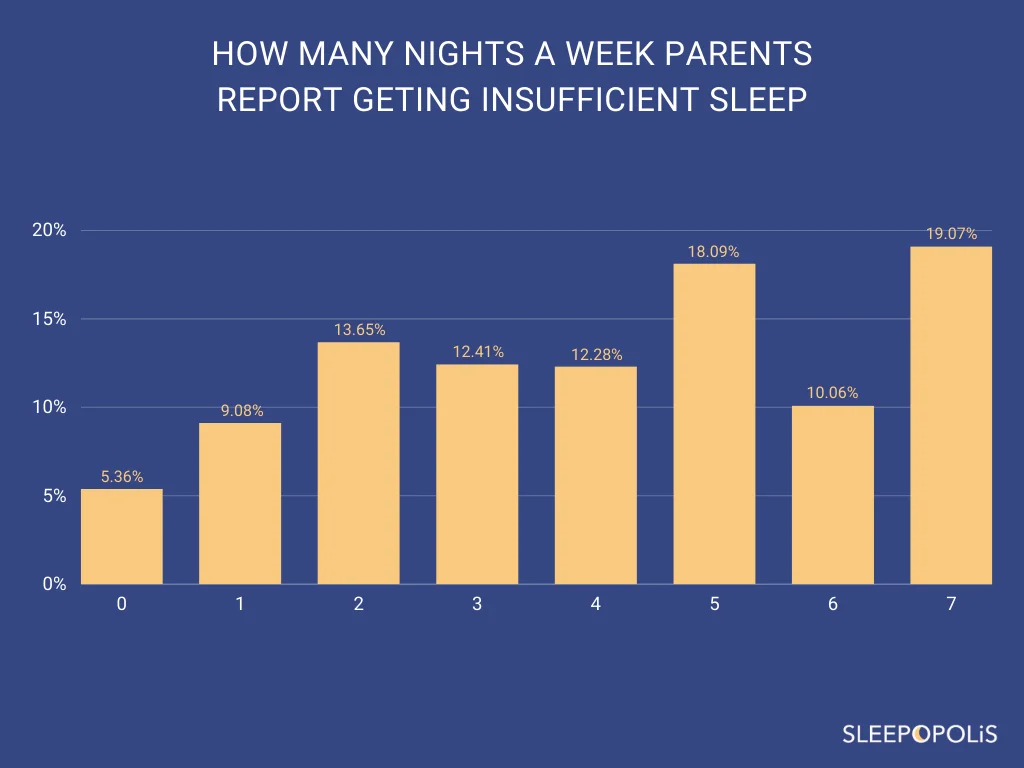
There were a few groups that reported more nights of insufficient sleep than others, according to our data:
- Women averaged 4.21 nights of insufficient sleep per week, while men averaged 3.85 nights.
- Parents with an annual household income of less than $25,000 per year had more nights of insufficient sleep (4.64) than higher income families.
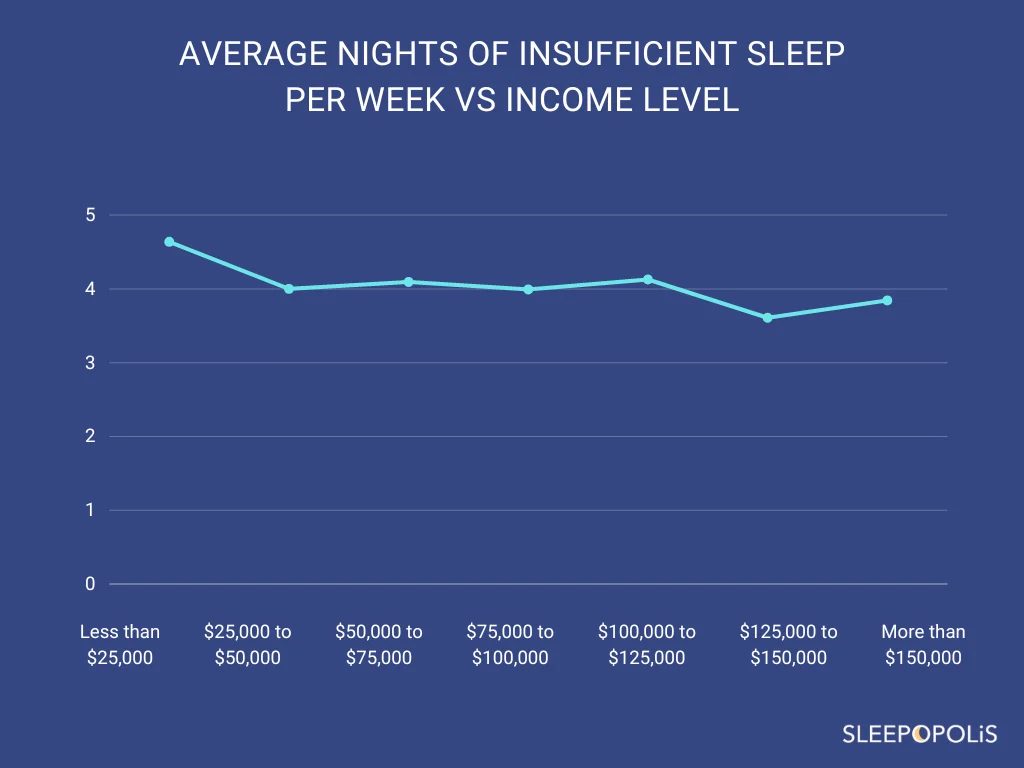
Sleep Deprivation Negatively Impacts Parenting Stress and Guilt
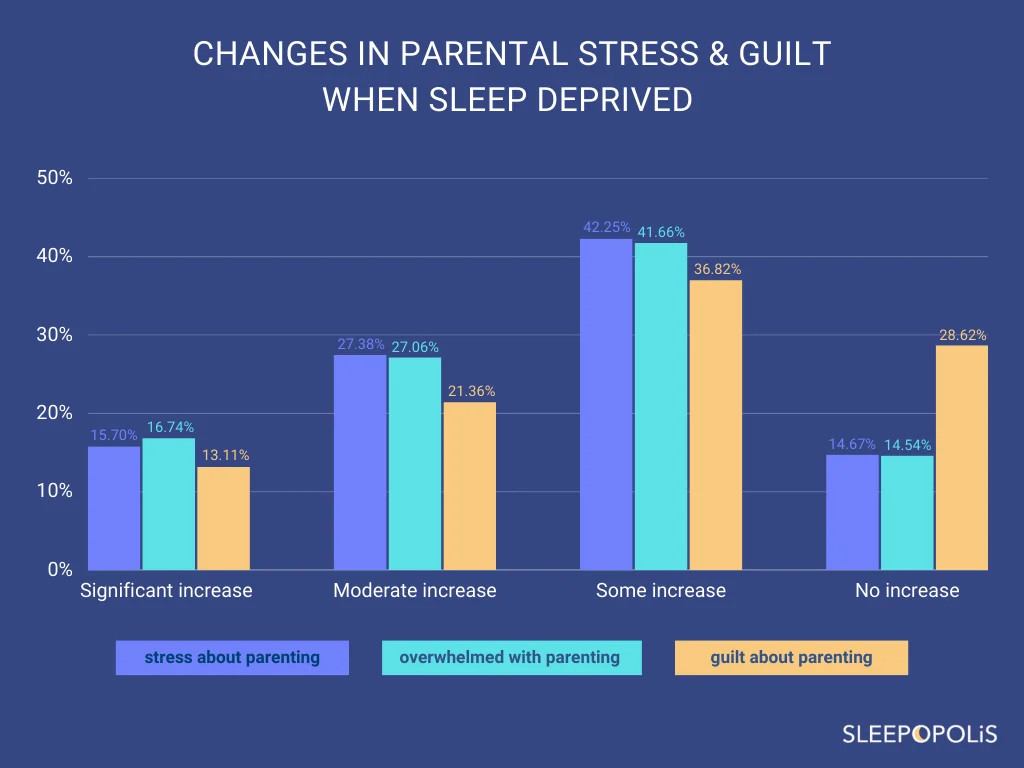
Sleep deprivation comes with a slew of unpleasant side effects, ranging from lack of alertness, irritability, impaired memory, and stress in the short term. With so many parents reporting insufficient sleep, we hypothesized that the effects of sleep deprivation would impact their parenting. Our results show that 8 in 10 parents reported at least some increase in parenting stress or guilt when sleep deprived:
- 85.45% of parents report feeling increasingly overwhelmed with parenting responsibilities when sleep deprived.
- 84.32% report increased stress while parenting through sleep deprivation.
- 71.35% say they have increased feelings of parental guilt when they don’t get enough sleep.
Negative Impacts of Sleep Deprivation Disproportionately Affect Women
Our data reveals that more nights of insufficient sleep are correlated with higher levels of general parenting stress and guilt (which we found was disproportionately higher in women). Interestingly, our 85.68% of women in our survey said they experienced parenting stress and guilt in general, compared to 72.0% of men.
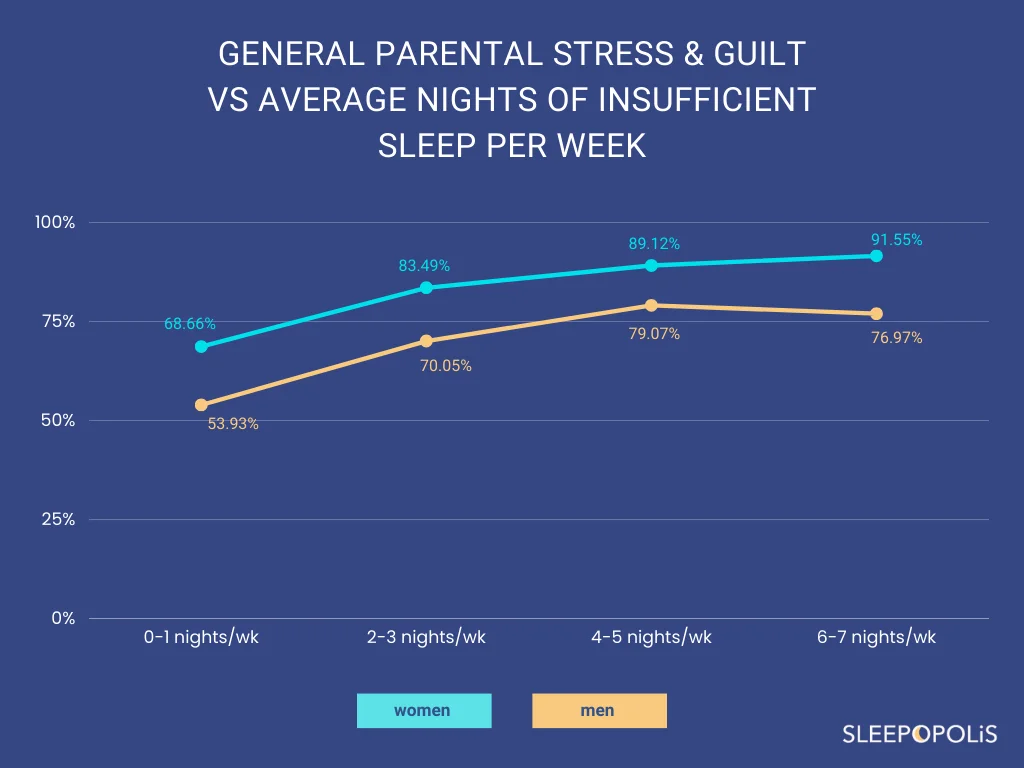
In addition to feeling more parenting stress and guilt in general, our data shows that women were more likely to experience significant increases in the following sleep deprivation impacts:
- Women were 4.33 times more likely to feel a significant increase in feeling overwhelmed with parenting responsibilities when sleep deprived.
- Women were 2.64 times more likely to feel a significant increase in parenting stress when sleep deprived.
Women were 3.38 times more likely to feel a significant increase in parenting guilt when sleep deprived.
“Revenge Bedtime Procrastination”, Defined
Revenge bedtime procrastination is the decision to push back bedtime, often in response to a lack of free time during the day. For example, someone who typically likes to go to bed around 10 p.m. may stay up until midnight while they scroll through social media or watch their favorite TV show. Without adjusting wakeup times, this can lead to sleep deprivation.
Parents, “Revenge Bedtime Procrastination”, and Sleep Loss
Our data suggests that a parent’s frequency of revenge bedtime procrastination may correlate to more nights of insufficient sleep. Parents that always participate in revenge bedtime procrastination average 5.41 nights of less than 7 hours of sleep per week, while those that never do so average 2.54 nights of insufficient sleep.
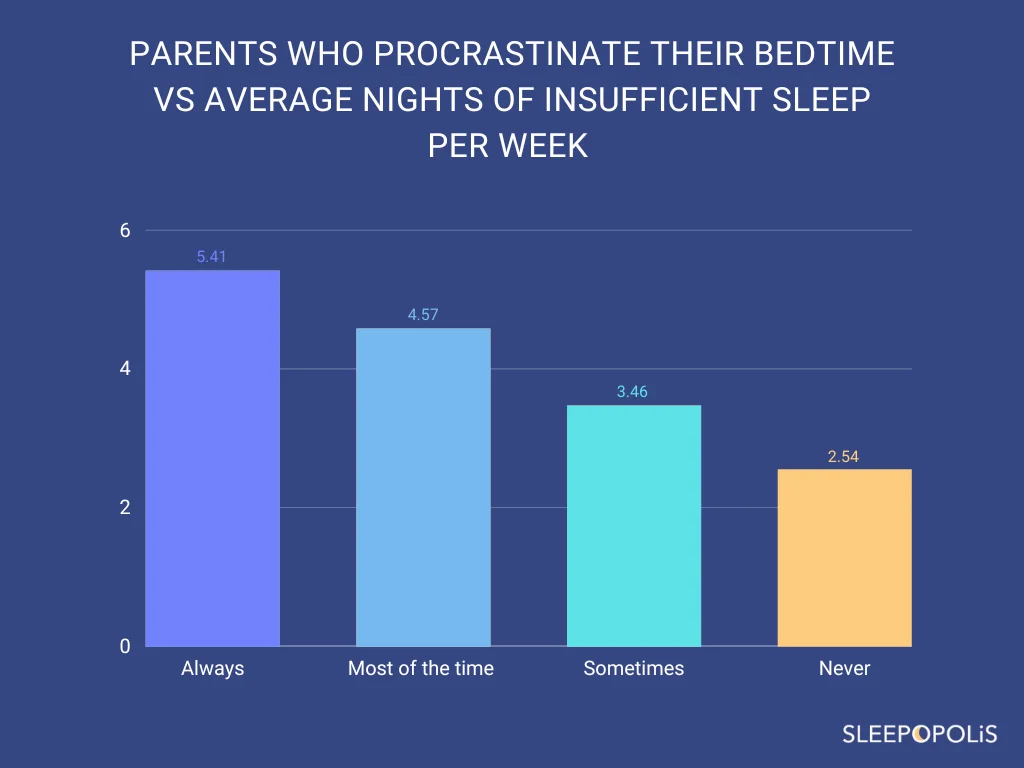
Almost Half of Parents Do “Revenge Bedtime Procrastination” Most of the Time or Always
Our survey found that 95.33% of parents report engaging in revenge bedtime procrastination because of a lack of free time during the day. Nearly half (48.02%) of those parents procrastinate most of the time or always. When procrastinating bedtime, over half of parents choose to do screen time activities (51.40%).
When looking at differences in revenge bedtime procrastination between groups, we found the following:
- Women are more likely to engage in revenge bedtime procrastination than men (51.18% do so most of the time or always compared to 43.17% of men).
- Parents with youngest children ages three and under had higher levels of revenge bedtime procrastination. Revenge bedtime procrastination rates trend downward as the age of a parents’ youngest children increases.
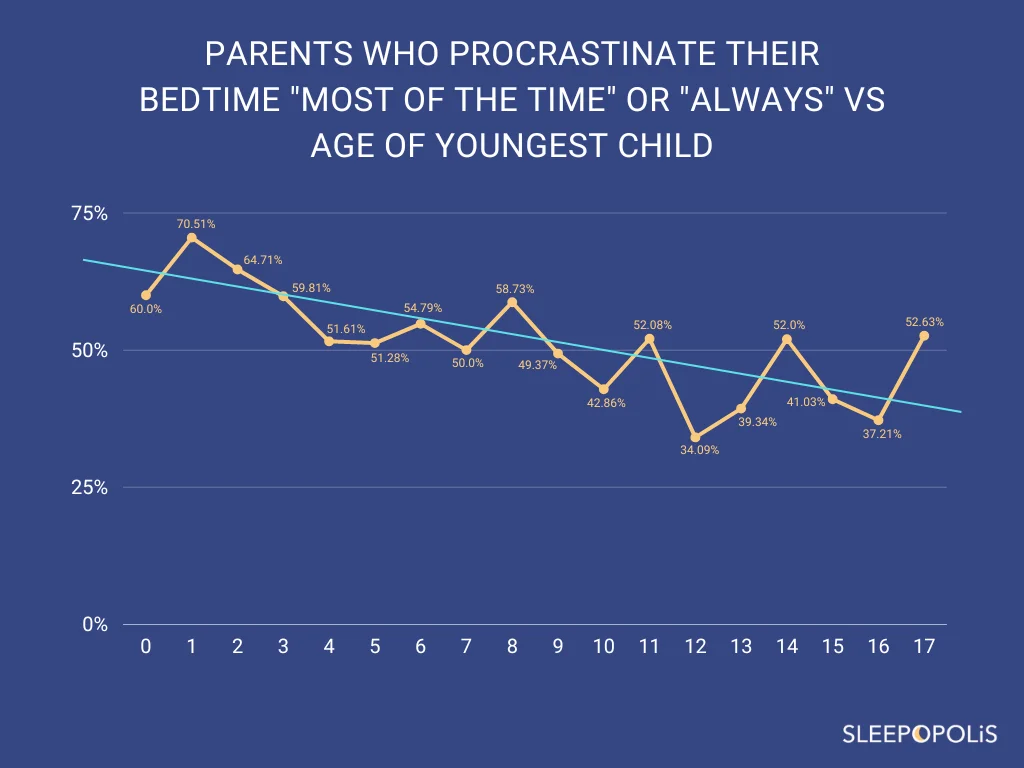
Revenge Bedtime Procrastination Negatively Impacts Parenting
Since revenge bedtime procrastination can lead to sleep deprivation, we hypothesized that it would also cause some parents to feel negative impacts while experiencing sleep loss. The sleep loss caused by revenge bedtime procrastination most commonly caused irritability while parenting, with 66.43% reporting this feeling after delaying bedtime, followed by:
- Stress (60.73%),
- Overwhelmed with parenting responsibilities (51.78%)
- Mood swings (32.47%)
- Guilt (26.96%),
- Regret (24.63%)
Disproportionate Impacts of Revenge Bedtime Procrastination
Similar to the trends we saw in sleep deprivation, revenge bedtime procrastination rates, and impacts of sleep deprivation on parenting feelings, women in our study reported increased impacts of revenge bedtime procrastination on their feelings while parenting the next day.
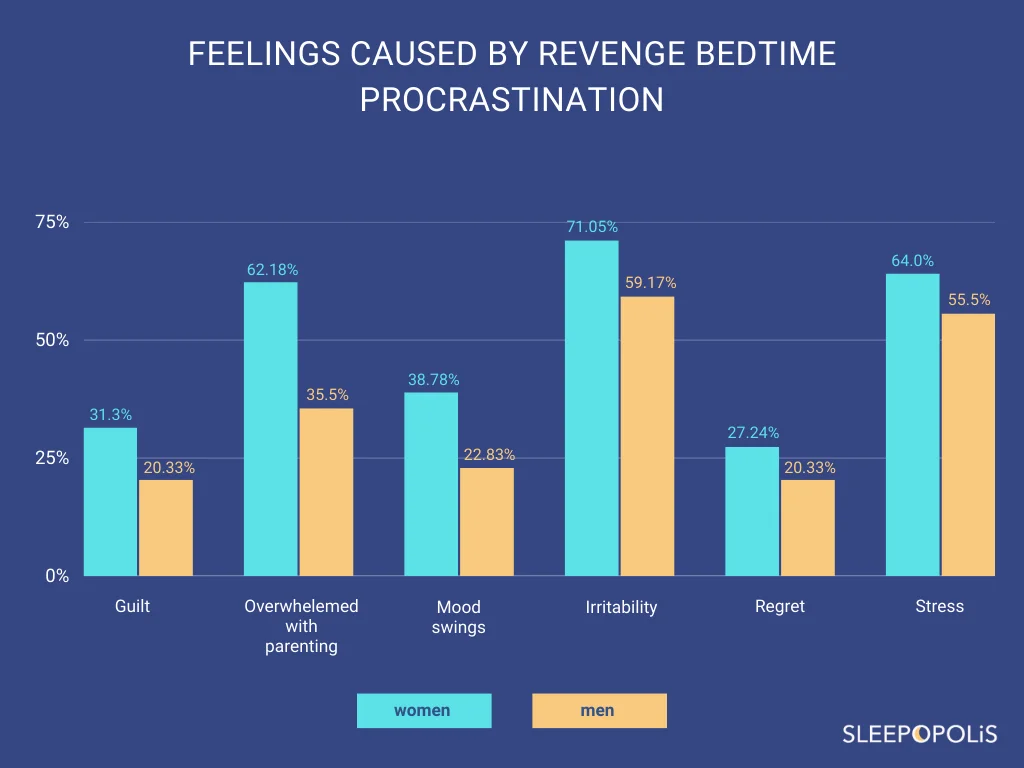
The impacts of revenge bedtime procrastination also appeared to decrease as parents’ income level increased. The percentage of parents with a household income of $25,000 or less that report feeling overwhelmed with parenting responsibilities (64.57%) is most drastically different to those making $150,000 or more (39.55%).
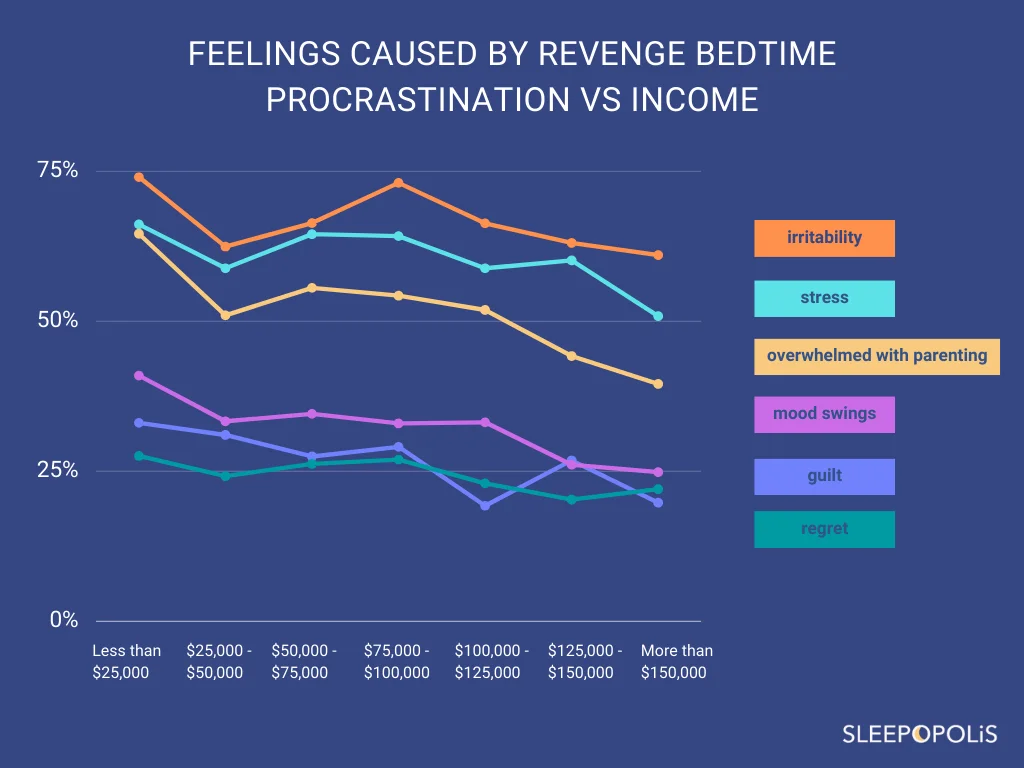
Revenge Bedtime Procrastination Compared to General Parenting Stress and Guilt
Our results also showed a correlation between general parenting stress and guilt and revenge bedtime procrastination. Parents that reported feeling general stress and guilt engaged in revenge bedtime procrastination the most often (62.80% do so “most of the time” or “always”). Only 23.51% of those that did not report general parenting stress and guilt regularly engaged in revenge bedtime procrastination.
The Last Word From Sleepopolis
Our data supports the popular understanding that parents, in general, are lacking sleep. What we also uncover in this study is that almost all parents (95.33%) engage in revenge bedtime procrastination due to limited free time, which can cause sleep loss. These two variables, sleep deprivation and revenge bedtime procrastination, can cause parents to have a range of negative feelings while parenting, including guilt and stress.
Methodology
Sleepopolis surveyed 1,541 parents in the United States from 07/17/2023 to 07/20/2023. The survey was conducted on Connect by CloudResearch.
Fair Use Statement
You are welcome to reference this report, including graphics, key findings, and insights. All we ask is that you please link back to this study. If you have any questions, please feel free to reach out to Brianna Auray by email at brianna.auray@mail.sleepopolis.com.


























